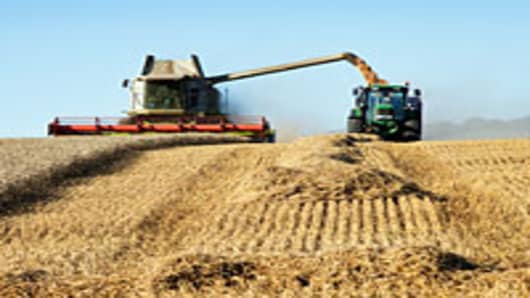The new head of the U.N. food agency said he expects food prices to remain volatile in 2012 —and more people will go hungry.
Jose Graziano da Silva, Brazil's former food security minister, took over as director-general of the Food and Agriculture Organization Jan. 1. He told reporters Tuesday his top priority was to make good on the agency's mandate: eradicate world hunger.
"Prices will not be going up as in the sense of the last two to three years but will also not drop down. There may be some reductions but not drastic,'' Graziano da Silva told a news conference in Rome.
Global food prices measured by the FAO hit a peak in February, but have been falling since June as crops have improved and concerns about global economic turmoil have reined in demand growth.
High food prices have helped fuel inflationand contributed to civil unrest and the Arab Spring earlier this year.
Graziano da Silva said he did not expect the economic slowdown in Europe to impact funding for FAO projects, because the amount countries donated was such a small proportion of gross domestic productthat they were unlikely to cut it. He said the slowdown was likely to increase the number of people at risk of hunger in the world, however.
"We will have more work to do, with more people hungry, more people unemployed, and we will need new ways to assist them,'' he said, as he began a term of three and a half years.
The 62-year-old agronomist, who is the first Latin American at the helm of the U.N. agency, said he would focus efforts on poor countries that are most in need of outside help and that his priority would be Africa, particularly northern Africa. He plans a visit to the Horn of Africa early this year.
The FAO is the largest U.N. agency with an annual budget of some $1 billion and 3,600 workers.
Graziano da Silva, the former head of the FAO in Latin America and the Caribbean and a former minister for food security in Brazil, will need to bridge a divide between donor countries and developing countries to foster consensus and avoid paralysis in the organization.
He plans to cut bureaucracy and reduce perks for top management and he also wants to decentralize operations and give more authority to local outposts, he said.
The FAO adopted reforms after an assessment funded by its members in 2007, which said it risked "terminal decline'' due to its weak governance and lack of transparency and accountability.
Last year, however, Britain threatened to pull out of the organization unless it improved its performance, and some donors such as the U.S. have initiated agricultural development projects of their own.


